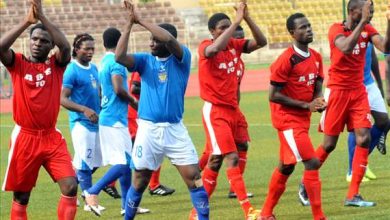Russia 2018: The VAR technology’s role in Super Eagles’ exit

The World Cup will put the greatest footballing nations on earth to the test. But there is another trial happening, perhaps just as important as and even more controversial than that of VAR, or the Video Assistant Referee.
The technology is being used at the World Cup for the first time ever and has the potential to fundamentally change games. It could decide the future of the tournament, by reversing some of the most important refereeing decisions in the game.
Nigeria had clawed their way back into the World Cup Group D match thanks to a Victor Moses penalty after Lionel Messi had opened the scoring.
But the African side thought they were deserving of a second penalty when Marcos Rojo headed the ball onto his own arm.
The referee did not blow his whistle and moment’s later Nigeria striker Odion Ighalo wasted a glorious opportunity to score from 14 yards out.
.Ref Cuneyt Cakir refused to give a spot kick immediately and went to VAR, who then called him over to the off-pitch TV screen.
And after some moments of deliberation Cakir gave a goal kick.
Nigeria was furious but Cakir evidently believed Rojo’s handball was not intentional.
But the decision has already caused controversy, with Iran earning a penalty off a handball by Portugal’s Cedric Soares last night.
Iran scored their spot-kick to earn an unlikely draw against Portugal, even though plenty thought Soares was unlucky to be penalised.
John Obi Mikel voiced his frustrations at the decision at full-time.
“It was a clear penalty for me,” he said.
Nigeria pleased for the referee to consult VAR, only for him to reject the penalty claims anyway
“If you look at the Portugal game yesterday, this wasn’t close to that. This was worse. We have seen it again in the dressing room. It was a clear handball.
“The referee looked at the VAR. He said it hit the hand. I asked why he didn’t give the penalty, but he said he didn’t know.”
How does it work?
There are 13 officials who can be chosen as the Video Assistant Referee. They will all sit in a special hub in Moscow – no matter where the game is happening – and they will do so wearing their full kit, as if they were ready to jump onto the pitch at any time.
The VAR will watch the whole of each game. If they see something wrong, they can flag it to the referee; if the referee thinks something is wrong, he can get in touch with the VAR.
Either way, the VAR is only advisory. Any decision ultimately rests with the referee, even if he was advised the opposite way by the VAR.
What can spectators see?
Perhaps the strangest and most confusing part of VAR is the fact that spectators won’t actually get to see any of the replays, or even necessarily know what is happening. At most, they’ll see the referee make the TV screen sign and perhaps head off to watch the pitch-side review.
Does it make any difference to players?
In the more direct sense – that is, discounting any arguments about whether it will change the pace of games – VAR doesn’t allow players to do anything specific. In fact, the only significant rule change is what players can’t do: they must not make the VAR sign themselves, in the same way they can’t pretend to hold up a yellow card to someone as part of a protest, and they can be booked if they try it.
Why FIFA decided to use it?
The sport’s governing bodies want to improve decision making and accuracy.
“I would say to the fans, players and coaches that it will have an impact, a positive impact,” said FIFA President Infantino.
What are some of the criticisms?
There have been several controversies and teething problems during VAR’s trial stages, and the system has many opponents. Their criticisms have included:
Fans in the stadium not being aware of when a decision is being reviewed, particularly in venues with no big screen. FIFA say they are working on a system to keep supporters informed.
The subjective nature of football’s laws. Despite the availability of replays, there remain debates and disagreements about penalty incidents. Decisions still come down to human interpretation.
The time it takes for decisions to be reached disrupts the flow of the match. Some games with VAR in use have produced five or six minutes of first-half stoppage time.
The spontaneous joy of goal celebrations being lost due to the possibility of a review, detrimental to the atmosphere in stadiums.
Vital stats after the first round of the World Cup
- Senegal defeated Poland to become the first African country to win a game in the ongoing FIFA World Cup
- Yuri Gazinskiy of Russia was the first player to score in the 2018 FIFA World Cup in his side’s 5-0 win over Saudi Arabia.
- Cristiano Ronaldo’s fourth minute goal is the fastest goal of the tournament thus far.
- No hosts have ever lost their opening World Cup game and Russia ensured that tradition continued by mauling Saudi Arabia 5-0.
- For the first time in the history of the World Cup, the Video Assistant Referee was used. France benefited from the first ever VAR decision, when Antoine Griezman was awarded a penalty after a replay and he finished it off perfectly in France’s 2-1 victory against Australia.
- Lionel Messi was the first player to miss a penalty in the tournament and it happened in Argentina’s opener against debutants Iceland in a one all draw.
- A total of nine (9) penalties were awarded in the first round
- Seven of the penalties awarded were perfectly converted.
- Aziz Bouhaddouz of Morocco was the first player to score an own goal in the tournament in a game his side lost 0-1 to Iran.
- Japan defeated Colombia 2-1 to become the first Asians to beat a South American nation at the Mundial in 18 meeting in the finals.
- The first round recorded a total of 50 yellow cards
- Carlos Sánchez of Colombia was the only player to have been sent off and is the second fastest red card in the history of the World Cup. It happened as Colombia suffered a 2-1 defeat against Japan in the third minute.
- Cristiano Ronaldo scored more goals in the first round of the ongoing tournament- a hat-trick against Spain.
- The Portuguese skipper’s hat-trick against Spain has made him the oldest player to bag a hat-trick in the World Cup at 33 year and some months and days.
- Aleksandr Golovin of Russia was the first to be yellow carded and it came in their 5-0 win over Saudi Arabia in the 10 minute.
- Senegal became the first African country to win a game in the ongoing FIFA World Cup, after they edged Poland 2-1 in their opening group H game. All the other four African representatives namely Egypt, Morocco, Nigeria and Tunisia lost their opening games.
- Four goals have been scored from direct free kick.
How Super Eagles rated Vs Argentina
We evaluate the performance of Super Eagles players in the 2-1 defeat against Argentina in their Group D clash at the 2018 FIFA World Cup…
Francis Uzoho 7/10
Conceded twice in the game despite having little to do. The young goalkeeper will need to work on his ball distribution ability but he was alert and made some key saves
Leon Balogun 6/10
He was one of Nigeria’s top performers on the night. The centre-back put up a solid showing despite relentless pressure from the Argentines.
William Troost-Ekong 6/10
Had a torrid time stopping Gonzalo Higuain but still put in a decent showing.
Kenneth Omeruo 6/10
Lost Lionel Messi for the first goal but recovered from the early setback to prove his importance to the team, especially in the second half.
Victor Moses 5/10
Not one of his performances for the Super Eagles despite grabbing a goal in the game. The Chelsea man was at fault for Argentina’s second goal scored by Marcos Rojo.
Bryan Idowu 6/10
The Amker Perm of Russia defender was solid at the back but didn’t offer much going forward.
Wilfred Ndidi 7/10
Came alive after the break following a tepid first half. He was close to getting a goal with his well struck shot almost hitting the net.
Mikel Obi 7/10
A better performance from the captain who came alive like most of his teammates in the second half.
Oghenekaro Etebo 7/10
He was at his combative best in the game. Came close to registering his first goal of the competition with his second half free kick nearly sailing into the net.
Kelechi Iheanacho 4/10
Put up a shambolic performance and was duly substituted after the break.
Ahmed Musa 8/10
Lively as ever. He was a torn in the flesh of the Argentina defenders. He was Nigeria’s best player on the night
Substitutes
Odion Ighalo 5/10
The China-based forward added bite to the Super Eagles attack following his introduction but missed two gilt-edged chances that would have aided the Super Eagles qualification into the second round.
Alex Iwobi
Not Rated
Simeon Nwankwo
Not Rated





